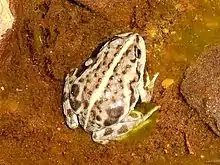Pleurodema bufoninum
Pleurodema bufoninum, the large four-eyed frog, is a species of frog in the family Leptodactylidae. It is found in Argentina and Chile. Its natural habitats are subantarctic forests, temperate forests, subantarctic shrubland, temperate shrubland, subtropical or tropical dry shrubland, subantarctic grassland, temperate grassland, intermittent rivers, swamps, intermittent freshwater marshes, arable land, rural gardens, ponds, and open excavations. The common name "four-eyed frog"[2] refers to two inguinal poison glands that resemble eyes.[3] When threatened, the frog lowers its head and raises its rear. When the frog adopts this posture, the poison glands are also raised toward the predator. The predator may also confuse the frog's raised posterior for the head of a larger animal.[4]
| Pleurodema bufoninum | |
|---|---|
 | |
| Scientific classification | |
| Domain: | Eukaryota |
| Kingdom: | Animalia |
| Phylum: | Chordata |
| Class: | Amphibia |
| Order: | Anura |
| Family: | Leptodactylidae |
| Genus: | Pleurodema |
| Species: | P. bufoninum |
| Binomial name | |
| Pleurodema bufoninum Bell, 1843 | |
| Synonyms | |
|
Pleurodema bufonina | |
References
- IUCN SSC Amphibian Specialist Group (2019). "Pleurodema bufoninum". IUCN Red List of Threatened Species. 2019: e.T57284A79813107. doi:10.2305/IUCN.UK.2019-1.RLTS.T57284A79813107.en. Retrieved 16 November 2021.
- Frost, Darrel R. (2013). "Pleurodema Tschudi, 1838". Amphibian Species of the World 5.6, an Online Reference. American Museum of Natural History. Retrieved 3 December 2013.
- "Species profile: four-eyed frog". Conservacion Patagonic. 2012-11-16. Retrieved 9 January 2014.
- Duellman, William E. (1994). Biology of Amphibians. Baltimore: JHU Press. p. 670. ISBN 9780801847806.
